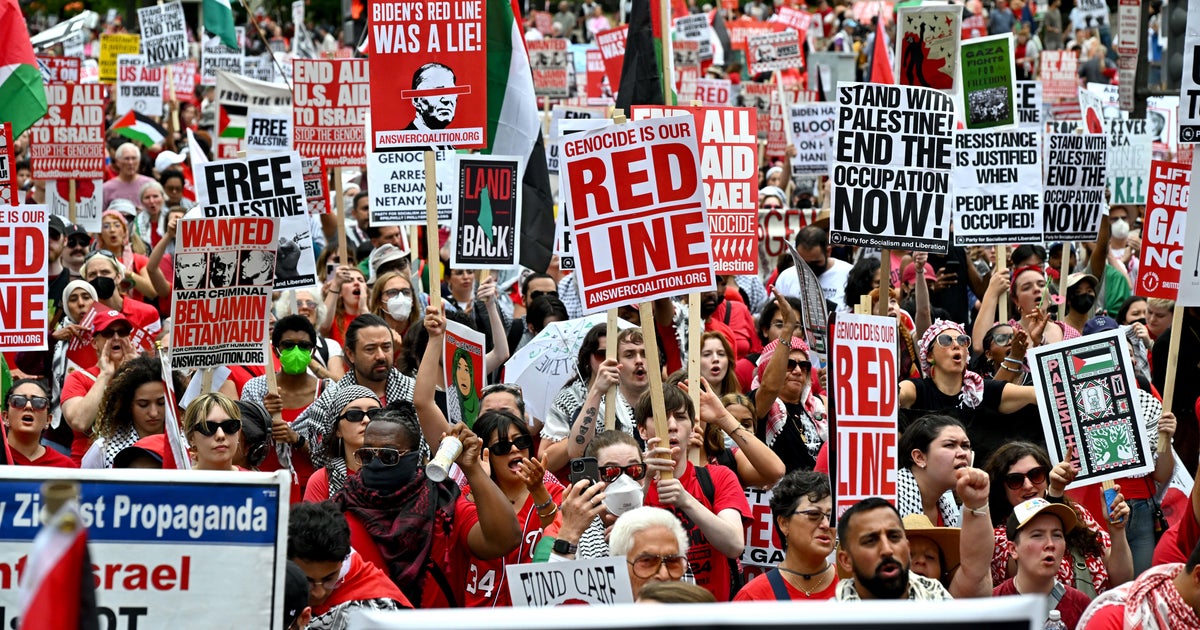Israel-Hamas war leaves thousands of Palestinians in Gaza facing "death by starvation," aid group warns
Humanitarian agencies are issuing increasingly urgent warnings that thousands of Palestinian civilians trapped in the Gaza Strip amid Israel's war with Hamas face starvation. The Palestinian arm of the international charity ActionAid said Tuesday that one month into the war sparked by Hamas' terror attack on Israel, more than half a million people "who have barely survived the relentless bombing, face death by starvation as food supplies run perilously low" in the northern part of Gaza.
The northern part of the narrow, 25-mile-long Palestinian territory has been the scene of the most punishing Israeli airstrikes and its more recently launched ground operations. CBS News correspondent Charlie D'Agata rode along with Israeli soldiers Tuesday as they carried out an operation in the town of Beit Hanoun, whose roughly 60,000 inhabitants were virtually all gone, but there was still fighting.
Many of the civilians who live in Beit Hanoun and other towns across northern Gaza have fled south, as Israel's military has urged them to do for weeks, but with airstrikes regularly hitting all across the densely populated enclave — including in the south — others have either been unable or unwilling to risk the journey through a war zone.
"Aid is still trickling into Gaza, but even the small amounts of food and water that make it over the border are barely able to be transported north, as roads have been destroyed in the near-constant bombardment," Riham Jafari, coordinator of advocacy and communication for ActionAid Palestine, said in a statement Tuesday, warning that cases of dehydration and malnutrition were rising fast.
The United Nations Office for the Coordination of Humanitarian Affairs, or OCHA, said Wednesday that none of the bakeries in northern Gaza were still functioning because they didn't have enough fuel, water or flour. The U.N. said in a statement, citing OCHA, that "no food or bottled water has been distributed there in a week."
"Nothing justifies the horror being endured by civilians in Gaza," Christian Lindmeier, spokesperson for the U.N.'s World Health Organization, said Tuesday, stressing the need for water, fuel and food. He reiterated the U.N.'s call for some 500 aid trucks to be given "unhindered, safe and secure access" to Gaza daily.
Aid trucks have been crossing into Gaza through the only border crossing not controlled and sealed by Israel, the Rafah crossing from Egypt, since Oct. 21, generally in convoys of fewer than 50 vehicles. The U.N. and aid organizations have said it's not nearly enough, and a spokesperson for Gaza's Hamas-run Ministry of Interior said earlier this week that none of the humanitarian supplies had reached northern Gaza.
Calls mount for a cease-fire, or at least a "pause"
The dire humanitarian situation in Gaza, which is home to some 2.3 million people, along with the spiraling civilian death toll that officials in the Hamas-run Palestinian territory put at more than 10,500 have drawn louder and louder calls for a cease-fire. The U.S., Israel's biggest backer, has not joined the many countries and organizations making that demand, however, calling instead for a "humanitarian pause" in the fighting.
Israel has rejected both ideas, saying any let-up in its military operation would only give Hamas time to regroup and make good on its threat to repeat the bloody attack it launched on southern Israel on Oct. 7, which saw the designated terror organization murder some 1,400 people and kidnap 241 others.
"Those calling for an immediate cease-fire have an obligation to explain how to address the unacceptable result that would likely bring about: Hamas left in place with more than 200 hostages, with the capacity and stated intent to repeat October 7, again and again and again," U.S. Secretary of State Antony Blinken said Wednesday.
Blinken spoke at a gathering of the Group of Seven wealthy industrialized nations in Japan, which issued a joint statement later in the day calling for the "unimpeded" delivery of food, water, fuel and medical supplies to Gaza, which they said should be facilitated by "humanitarian pauses" in the fighting.
"We had in-depth discussions about the steps that we are taking to address urgent needs on the ground. We all agreed that humanitarian pauses would advance key objectives to protect Palestinian civilians, to increase the sustained flow of humanitarian assistance, to allow our citizens and foreign nationals to exit, and to facilitate the release of hostages," Blinken told reporters, adding that he had briefed his G7 colleagues "about my conversations with Israeli leaders on pauses, and on concrete steps to minimize harm to Palestinian civilians."
Speaking to reporters Tuesday, a senior Israeli official said no pause was needed for the aid trucks to keep crossing the border from Egypt, but they added that Israel "may consider some localized pauses across the south or various parts of Gaza to allow an increase in the flow of humanitarian assistance."
International law experts and the U.N.'s human rights agency have warned that Israel's military response to the Hamas attack may amount to collective punishment of Gaza's civilian population in a way that violates international law.
"We are concerned that war crimes are being committed," U.N. human rights office spokesperson Ravina Shamdasani said near the end of October. "We are concerned about the collective punishment of Gazans in response to the atrocious attacks by Hamas, which also amounted to war crimes."
Israel says its military takes every possible precaution to avoid civilian casualties and it accuses Hamas of operating and storing weapons and fighters in civilian neighborhoods, including in schools, homes and hospitals.
Israeli Prime Minister Benjamin Netanyahu has vowed to "destroy Hamas" in response to the Oct. 7 attack, and he and other Israeli officials have warned the military operation in Gaza won't stop until that mission is accomplished. Israel has given no timeframe for its operations, but warned that its fight against Hamas could take months or even years.
Israel says it won't reoccupy Gaza
In addition to the repeated U.S. calls for humanitarian pauses in the war to allow more aid into Gaza and to facilitate efforts to rescue the scores of hostages held by Hamas, the Biden administration — starting with the president himself — has stressed that Israel should not seek to occupy the Gaza Strip after its military operation.
Hamas has run Gaza for almost 20 years, almost since Israel pulled its forces out of the region in 2005, but the other Palestinian territory, the much larger West Bank, while administered by the Western-backed Palestinian Authority, is occupied militarily by Israel.
Netanyahu appeared to raise the prospect of a Gaza occupation Tuesday, saying Israel would maintain "overall security responsibility" in the Palestinian territory for an "indefinite period."
In his remarks Wednesday, Blinken reiterated the Biden administration's stance against an occupation and said Israeli leaders had assured him there were no plans for one, but "the only question is, is there some transition period that might be necessary and what might be the mechanisms that you could put in place for that, to make sure that there is security."
A top advisor to Netanyahu offered little clarity Wednesday on Israel's medium to long-term plans in Gaza, saying whatever came after the war would not, in his words, amount to an occupation.
"When this is over and we have defeated Hamas, it is crucial that there won't be a resurgent terrorist element, a resurgent Hamas," senior Netanyahu advisor Mark Regev told CNN on Wednesday. "There will have to be an Israeli security presence, but that doesn't mean Israel is re-occupying Gaza, that doesn't mean that Israel is there to govern the Gazans."
In the absence of Hamas, it's unclear who or what might step in to administer daily life in Gaza. An official with the group's political rivals, the Palestinian faction Fatah, which leads the Palestinian Authority in the West Bank, told CBS News recently that it would not ride in"on an Israeli tank to rule Gaza."




